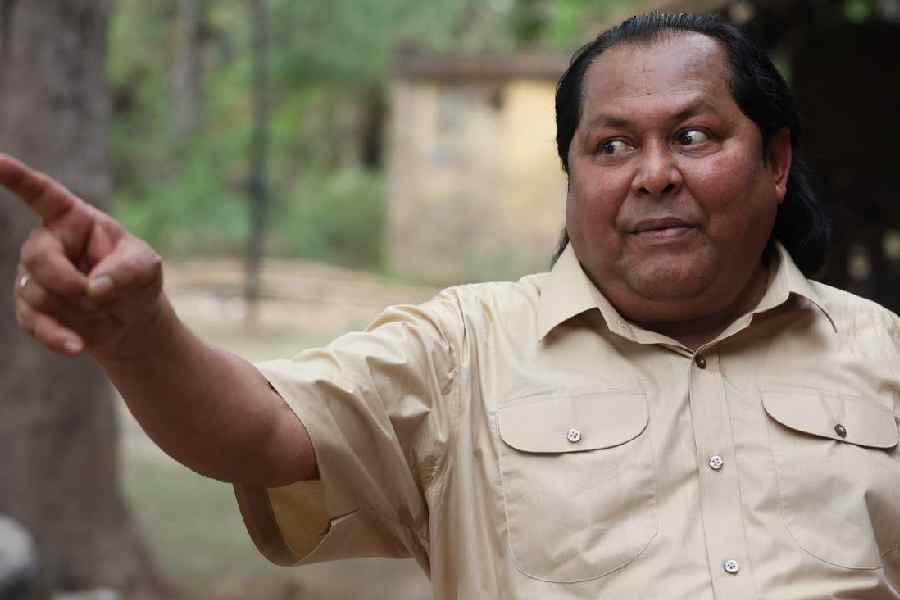In a career spanning more than three decades, versatile actor Kharaj Mukherjee is perhaps best known for his humorous roles, to which he brings an unmatched freshness and sincerity every time the audience sees him on screen. His latest film Bogla Mama Jug Jug Jiyo, which releases today, is being billed as a family entertainer and a story that has its heart in the right place.
Bogla Mama, the eponymous character played by Mukherjee, is already a familiar character to the numerous fans of Rajkumar Moitra’s comedy series, which appeared in Chandmama, a popular monthly children’s magazine. While speaking to t2 though, the veteran actor revealed that he has simply attempted to understand and depict the character in the way that director Dhrubo Banerjee wanted him to. He described it as a dynamic process, which happened during the process of the making of the film. Additionally, several workshops and rehearsals with dialogues were practised before shooting began, to help him get into the skin of the character. Speaking about his character, the actor said: “Bogla Mama is a foodie. He is a fun-loving but headstrong person, a bit foolhardy and callous, yet emotional at his core. He is very much a life-like person, and is always in the thick of things.”
Mukherjee explained that the beauty of the film’s script, which is borrowed from literature, ensured that no external mannerisms or dialect was needed to make the character stand out as funny. Nor were any words used to that effect, as he said that would be like “tampering with the original characterisation”. Instead, he employed an unusual gesture, which the audience should be able to notice immediately, and which, he hopes, they find amusing. The character of Bogla Mama also has an interesting romantic angle that splendidly complements his humorous aspect. The romance in this film is usually light-hearted. Sometimes visualised as a moment that will make the audience burst into laughter, or as a tiff between him and his love-interest or even as Bogla’s unintended insensitivity towards her, the romantic scenes are “spontaneous, endearing and on occasion, quite intense”.
Shooting for the film was done in a friendly atmosphere, with lots of adda, discussions and a general sense of bonding, as in families, Mukherjee affirmed. Director Dhruba Banerjee, who could otherwise be “a perfectionist and a taskmaster”, would also be the one who came forward with the most generous compliments. The actor said that he found it extremely gratifying that the director actually looked forward to his actors’ opinions about portraying their roles and gave them enough freedom to improvise and experiment with their characters, provided they were logical and reasonable. He was particularly vocal in his praise of co-actors and stalwarts of the Bengali stage and screen Rajatava Dutta, Koushik Sen and other senior actors, who, he said, made his experience of working in the film “more satisfying and enjoyable”.
A special reflex
The film’s cast also comprises a fair number of theatre actors who have added a different dimension to it. Bogla Mama also reserved special mention for actor Biswanath Basu, who has delivered an “outstanding performance portraying a character that will definitely resonate with the audience. Even kids like Riddhi (Sen) and Ujan (Chatterjee) have performed superbly,” he said. The actor also commended the efforts of cinematographer Soumik Haldar who, he said “has brilliantly captured the mood of this film, both in its chaotic and quieter moments”.
Kharaj Mukherjee confessed that though he has played various kinds of roles, he believes that comic roles need a special reflex and have to be executed with a degree of cleverness. He however clarified that he does not consider this movie or his character as ‘comic’ as there are various layers to the character and to the story. “Bogla will make you laugh, but he will also make you think. And though it is named after Bogla Mama, the story is not just about him. Other characters also have their own story and are significant in their own way. In fact actors like Rajatava Dutta and Koushik Sen have delivered fantastic, nuanced performances that one would not expect from an entertaining film like this,” he said.
With other Bengali films like Pradhan and Boomerang (where he will be seen in a completely different avatar) in the offing and a few Hindi projects on the anvil, he remains firm in his belief that Bogla Mama deserves a place in the catalogue of good, entertaining Bengali cinema of all time. Wrapped in a colourful package, it harks back to the wonderful era of black-and-white Bengali films. “It evokes the pure nostalgia, simplicity, laughter and bonhomie of a period not too long ago, that is now all but lost. The para (neighbourhood) culture of ’70s and ’80s Bengal is captured vividly in this film, where the whole neighbourhood was like one big happy family; where people truly cared about and supported one another in good or bad times, in happiness or in distress. The film reminds us of these long lost ideals and value systems that we direly need to turn back to, in today’s selfish society,” he said. The actor added that this film’s focus is on reaching out to the audience and touching their souls, which he feels is the need of the day.
While acknowledging that contemporary Bengali comedy films mainly suffer from a weak storyline, he regretted that filmmakers usually tend to neglect the rich treasure trove of humorous literature in Bengali for pathetic plots that make a mockery of the genre. Too much buffoonery and slapstick comedy have made things worse for the audience. He therefore lauded director Dhrubo Banerjee for deviating from this practice and showing the way by reviving a robust and engaging story from contemporary Bengali literature, expressing the hope that the audience will love the film enough for it to mandate a sequel.











